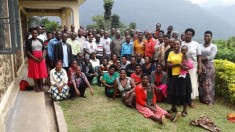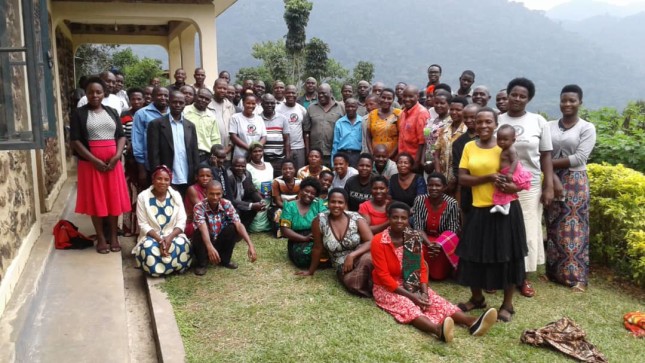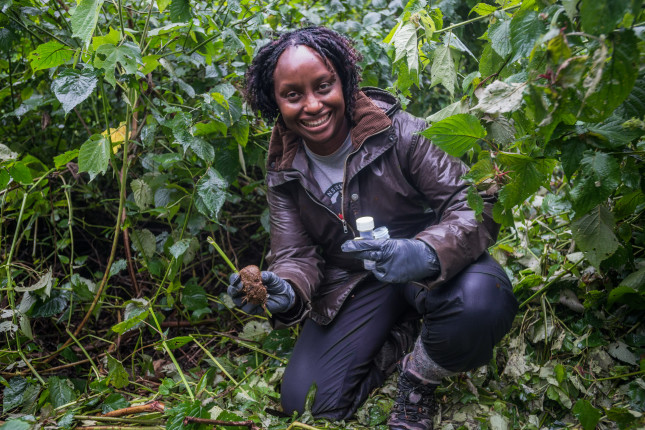-
Advancing One Health: Protecting People, Gorillas, and the Land on Which They Live
February 19, 2020 By Gladys Kalema-Zikusoka In 2003, a scabies skin disease outbreak affecting mountain gorillas in Bwindi Impenetrable National Park was traced to people living around the national park—people with limited access to basic health and social services. To protect the people and wildlife of this special park, we launched Conservation Through Public Health (CTPH), an NGO that promotes biodiversity conservation by enabling people, gorillas, and other wildlife to coexist harmoniously through improved health and wellbeing.
In 2003, a scabies skin disease outbreak affecting mountain gorillas in Bwindi Impenetrable National Park was traced to people living around the national park—people with limited access to basic health and social services. To protect the people and wildlife of this special park, we launched Conservation Through Public Health (CTPH), an NGO that promotes biodiversity conservation by enabling people, gorillas, and other wildlife to coexist harmoniously through improved health and wellbeing.In 2003, a scabies skin disease outbreak affecting mountain gorillas in Bwindi Impenetrable National Park was traced to people living around the national park—people with limited access to basic health and social services. To protect the people and wildlife of this special park, we launched Conservation Through Public Health (CTPH), an NGO that promotes biodiversity conservation by enabling people, gorillas, and other wildlife to coexist harmoniously through improved health and wellbeing.
Our first priority was to prevent zoonotic disease transmission between people and wildlife. The average family size in the community at the time was 10 children and, according to community members, while half of the children were sent to school, the other half were kept home to chase gorillas and other wildlife from the garden. People were struggling to provide adequately for their large families and, lacking alternatives, would enter the gorillas’ habitat in search of medicine, food, and fuelwood.
We set about understanding the community’s needs and priorities. For men in the community, the priority was primarily financial—achieving a balanced family budget. The women expressed a desire to have more control over their bodies and, ultimately, their lives. We quickly recognized the benefits that family planning—that is, providing access to women and couples to the information and tools they need to manage the number of children they have, and to achieve healthy spacing and timing of their births—could bring to both men and women in the community, and started a program to integrate population, health, and the environment (PHE) goals.
Our Village Health Teams (Community Health Workers) are trained to be a resource for communities. They provide information to their communities about family planning, good health, hygiene and sanitation, nutrition, sustainable agriculture, and gorilla and forest conservation. They track where and when gorillas and other wildlife encroach on community homes so that potential sources of zoonotic disease transmission, as well as human-gorilla conflict, can be identified and addressed.
Before we introduced Village Health Teams, the number of women in the community using modern family planning methods was just 22 percent, while the national average in rural areas of Uganda was 30 percent. Ten years later, in 2017, the number of women using family planning in Bwindi had increased to 67 percent, considerably overtaking the national average of 45 percent.
With a smaller family, less pressure is placed on family and household resources, reducing the need to enter the forest to supplement household diets with wild animal protein and fuelwood needs. This has positive impacts on the gorillas and local ecosystem – which, ultimately, has further positive impacts on the community as natural resources are managed more sustainably.

When we started out in 2003, the idea of addressing human, animal, and ecosystem health together was just emerging in the development community. Today, there is a global effort, called One Health, to better understand and respond to the connections between human, animal, and ecosystem health. One takeaway from our work that we hope is reflected in the greater One Health agenda is the critical role that family planning has played in our One Health approach.
We are now introducing our PHE model to other gorilla protected areas. Importantly, we understand that while the PHE model is effective, there is no one-size-fits-all approach, and the unique needs of each community must be incorporated into the PHE response. In the Virungas, for example, the local community is predominantly Catholic and living in extreme poverty. We focused our message on how making decisions about family size can enable families to manage their budget to ensure adequate healthcare and education for their children.
Engaging local partners, like the Jane Goodall Institute, has allowed us to replicate the project in another great ape site, the Budongo Forest, which is inhabited by chimpanzees susceptible to human disease. In a non-great ape protected site, Mount Elgon, a high population density of 1,000 people per square kilometre and population growth rate of 3.4 percent per annum is contributing to heavy encroachment into the national park and landslides. To address this, we’ve partnered with the Uganda Wildlife Authority and local government partners, who are taking a leadership role.
In 2018, mountain gorillas were reclassified from critically endangered to endangered, after their numbers surpassed the threshold of 1,000 and showing a positive growth trend to a minimum of 1,063 individuals. In fact, they are the only gorilla subspecies to be taken off the IUCN critically endangered list—sadly, the numbers for all the other gorilla subspecies are declining. The threats to all gorillas continue, including habitat loss, poaching, bush meat trade, disease, conflict with humans, and climate change, all exacerbated by poverty and high human population growth rates.
While we are proud of the contribution that CTPH has made to the conservation efforts that have enabled the mountain gorilla population to have a positive growth trend, we must redouble our efforts to ensure continued positive outcomes for gorillas and humans alike.
Dr. Gladys Kalema-Zikusoka is an Ashoka fellow, National Geographic Explorer, 2018 Sierra Club Earthcare Award winner and recent Tusk Conservation Award 2019 finalist. She founded and is CEO of both Conservation Through Public Health and Gorilla Conservation Coffee, a social enterprise of CTPH which brings financial viability to coffee farmers in Bwindi, improving livelihoods and decreasing reliance on the national park’s natural resources to cater for family needs, through the development and global marketing of a luxury coffee brand.
CTPH is grateful to many donors, including USAID, United States Fish and Wildlife Service, FHI360, Population Reference Bureau, Population Connection, Tusk Trust, Darwin Initiative, Global Development Network, Mulago Foundation, Disney Conservation Fund, Whitley Fund for Nature, and National Geographic for their support.
Sources: Conservation through Public Health, Jane Goodall Institute.
Photo Credit: A group photo of Village Health and Conservation Teams after a training at the Gorilla Health and Community Conservation Center. Photo courtesy of Conservation Through Public Health. All Rights Reserved.
 A Publication of the Stimson Center.
A Publication of the Stimson Center.

 In 2003, a scabies skin disease outbreak affecting mountain gorillas in Bwindi Impenetrable National Park was traced to people living around the national park—people with limited access to basic health and social services. To protect the people and wildlife of this special park, we launched
In 2003, a scabies skin disease outbreak affecting mountain gorillas in Bwindi Impenetrable National Park was traced to people living around the national park—people with limited access to basic health and social services. To protect the people and wildlife of this special park, we launched  “
“


